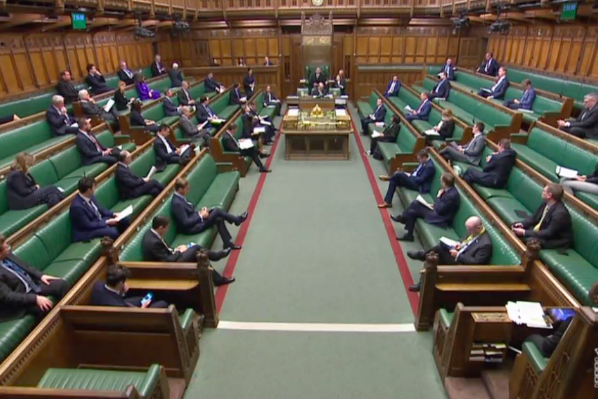Why can’t parliamentary democracy be run online?
There have been fears about holding the government to account during a shutdown, writes John Rentoul


Parliament closed down for the Easter recess a week early on Wednesday night, prompting some to ask why democracy should be suspended at a moment of national crisis. Why could MPs not continue to hold the government to account through some form of online democracy?
After all, they have electronic voting in several parliaments around the world, including the European parliament, and, as many people have been discovering over the past few days, videoconferencing is easy once older people have learned to press the right buttons.
In fact, parliament does not need new technology to observe social distancing. It is surprisingly straightforward for MPs to be in the chamber of the House of Commons while keeping two metres apart. The only exception to this so far is Nadine Dorries, the health minister, who has already had coronavirus and is therefore not expected to give it to anyone else or to get it again herself.
Lindsay Hoyle, the speaker, also announced on Monday temporary measures to allow social distancing during votes, and to allow select committees to take evidence by video.
The temporary arrangements were not actually needed this week – the coronavirus bill granting ministers, the police and immigration authorities exceptional powers was amended by agreement between government and opposition and passed without a vote.
But if there had been a vote – called a division – MPs would have walked through the Aye and the No lobbies to have their vote recorded, but at separate times for three alphabetical groups so that they could keep their distance from each other. “A division may take between 30 and 40 minutes to conduct this way,” the speaker said, as opposed to the usual 15 minutes.
The speaker also admitted that videoconferencing facilities for committees “are currently limited”, not least because of staff absences. He promised that “further work in this area will be taken forward as a matter of priority over the Easter recess”.
But the real reason for the early shutdown is that most MPs feel uncomfortable about requiring support staff to keep coming into Westminster at a time when most activity in the country is being shut down.
Of course, democratic accountability is essential, they say, but most of them feel they have carried out their duty in that respect. Even Jeremy Corbyn has accepted the early shutdown, arguing that he persuaded the government to amend the coronavirus bill so that it must be renewed every six months; and he secured a double-length session of Prime Minister’s Questions yesterday.
Most MPs I speak to seem to think they can do more good helping local efforts in their constituencies. What I find surprising is that even the most hostile to Boris Johnson do not seem to fear that he will assume the authoritarian powers of a police state while parliament is in recess – on the contrary, many of them criticise him for not having already imposed more draconian measures.
Join our commenting forum
Join thought-provoking conversations, follow other Independent readers and see their replies
Comments